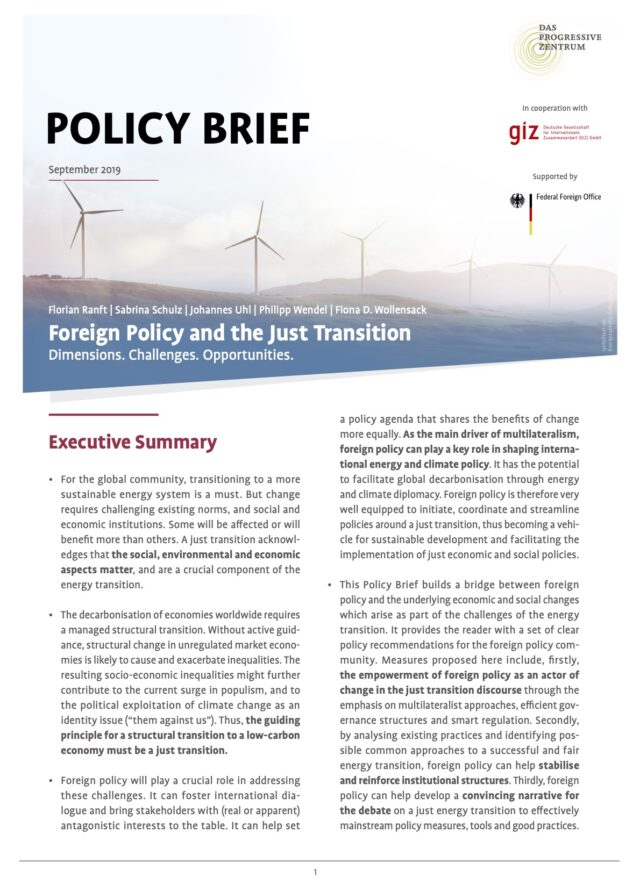Summary
For the global community, transitioning to a more sustainable energy system is a must. But change requires challenging existing norms, and social and economic institutions. A Just Transition acknowledges that the social, environmental and economic aspects matter, and are a crucial component of the energy transition. This Policy Brief builds a bridge between foreign policy and the underlying economic and social changes which arise as part of the challenges of the energy transition.
The Key Policy Recommendations
1. Governance: Foreign Policy as an Actor of Change
This includes positioning itself as a multilateral facilitator of global governance, the introduction of working groups within foreign ministries and adding a human rights perspective to energy and climate policy.
2. Europe as a leading Example
This includes promoting the idea of a “European Green Deal” for the energy and transport sector, strengthening the European Coal Regions in Transition Platform and hosting a “Just Transition Summit”.
3. Inclusive Approaches for Successful Coalitions for Change
This includes making use of the expertise of different actors at the international level, providing for a for exchange and the transfer of knowledge and experiences and building new partnerships.
4. Bold Public Diplomacy: Think like a System, act like an Entrepreneur
This includes initiating a debate on both the challenges and the opportunities of the low-carbon transition, creating an international narrative on its equity, prosperity and security dimensions and establishing a deeper engagement with citizens, businesses, local and regional leaders and civil society.
Background: The Just Transition Concept
The just transition concept is rooted in the trade union movement and seeks to ensure good quality jobs and high living standards for everyone in a decarbonised economy. Key elements of a just transition include a comprehensive policy framework to address the negative impacts for and meaningful social dialogue with those who stand to lose their livelihoods throughout transition processes. The concept acknowledges the need for fairness for countries, regions and workers that will be affected disproportionately by the negative consequences of the transition.
A global energy transition itself will also have geopolitical implications. Countries that depend on the export of fossil fuels face risks to their income base and geopolitical status. At the same time, however, the energy transition means lower risks for other countries from volatile energy prices or through the disruption of their energy supply chains, and fewer conflicts related to access to fossil fuels. Furthermore, developing countries can take advantage of affordable renewable energy technologies to provide energy access to their citizens, when technical and policy expertise is available in governmental institutions and society. In all these cases, foreign policy can play an important role.
Natural Allies: Foreign Policy and Just Transition
At first glance, addressing a just transition to a low-carbon economy may not be the most fitting task for diplomacy. After all, it has to deal with very local problems – notably structural economic transitions at the regional level. However, both the climate and the just transition challenges are global. As the Secretary-General of the International Trade Union Confederation (ITUC), Sharan Burrow, aptly put it, “there are no jobs on a dead planet”. A just transition is a global challenge which requires a multilateralist approach and which benefits from mutual learning and joint action.
Authors
Varianzen der Transformation
No Backlash, No Retreat
Mir reicht's Bürger
Progressive Governance: Rise or Demise – How Democracies Can Withstand Authoritarian Attacks
Paving the Way Towards Resilient European Civic Cooperation

Content

Wir entwickeln und debattieren Ideen für den gesellschaftlichen Fortschritt – und bringen diejenigen zusammen, die sie in die Tat umsetzen. Unser Ziel als Think Tank: das Gelingen einer gerechten Transformation. ▸ Mehr erfahren





